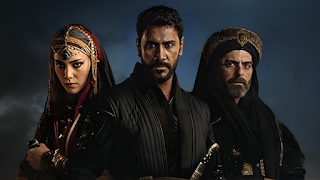Salahuddin Ayyubi, also known as Saladin, was a legendary 12th-century Muslim leader and founder of the Ayyubid dynasty, best known for uniting the Muslim world and recapturing Jerusalem from the Crusaders in 1187. Born in Tikrit (modern-day Iraq) to a Kurdish family, he rose to power in Egypt and Syria, replacing the Fatimid Caliphate with Sunni rule. Revered for his military brilliance, justice, and chivalry, he became a symbol of Islamic unity and resistance, even earning the respect of his rivals like King Richard the Lionheart during the Third Crusade. Salahuddin remains a timeless icon of honor, piety, and leadership in Islamic history.
Here's a brief overview of his life and achievements:
🏹 Who Was Salahuddin Ayyubi?
Full Name: Ṣalāḥ ad-Dīn Yūsuf ibn Ayyūb
Born: 1137/1138 CE in Tikrit, present-day Iraq
Died: March 4, 1193 CE in Damascus, Syria
Title: Sultan of Egypt and Syria; founder of the Ayyubid dynasty
🛡️ Legacy and Major Achievements
1. Unification of Muslim Lands
Before facing the Crusaders, Salahuddin focused on unifying the Muslim territories of Egypt, Syria, Mesopotamia, and parts of the Arabian Peninsula, which were fragmented and often in conflict.
2. Recapture of Jerusalem (1187)
His most famous military success was the Battle of Hattin in 1187, which led to the recapture of Jerusalem from the Crusaders. This victory was a major turning point in the Crusades and greatly elevated his status in the Islamic world.
3. Chivalry and Honor
Salahuddin is admired not just for his military skills but for his noble character, generosity, and humane treatment of enemies—including during the Third Crusade, where he faced King Richard the Lionheart of England. Even Western chroniclers praised his ethics in warfare.
4. The Ayyubid Dynasty
He established the Ayyubid dynasty, which ruled over parts of the Middle East until the 13th century and played a key role in Islamic governance, culture, and defense against the Crusaders.
📜 Religious and Cultural Contributions
- Salahuddin was a Sunni Muslim and a follower of the Shafi'i school of jurisprudence.
- He supported Islamic scholars, built madrasas and mosques, and revived Islamic institutions in Egypt that had declined under the previous Shi'a Fatimid Caliphate.
🌍 Why Is He Remembered Today?
Salahuddin Ayyubi remains a symbol of Islamic unity, resistance, and justice. He is celebrated across the Muslim world for his courage, leadership, and Islamic values.
🧒 Early Life & Background
Birth & Family
- Born in 1137 or 1138 CE in Tikrit, Iraq.
- Ethnic background: Kurdish.
- His father, Najm ad-Din Ayyub, was a military officer in service to Imad ad-Din Zengi, the ruler of Mosul and Aleppo.
Early Education & Military Exposure
- Salahuddin was well-educated in the Qur’an, Hadith, Islamic jurisprudence, and Arabic literature.
- He trained under his uncle Asad ad-Din Shirkuh, a general under the Zengid dynasty, and gained practical military experience during campaigns in Egypt.
🏰 Rise to Power in Egypt
Fatimid Caliphate's Decline
- In the 1160s, Egypt was under the Shi’a Fatimid Caliphate, which was weakening.
- Shirkuh led several expeditions to Egypt at the request of Nur ad-Din (the ruler of Syria) to counter Crusader influence.
Salahuddin Becomes Vizier
- After Shirkuh’s death in 1169, Salahuddin was appointed vizier of Egypt at just 31 years old.
- Though Egypt was nominally Shi’a, Salahuddin re-established Sunni Islam, aligning it with the Abbasid Caliphate in Baghdad.
Formation of Ayyubid Dynasty
- After Nur ad-Din’s death in 1174, Salahuddin took control of Damascus, Aleppo, and other cities, gradually forming a unified Sunni Muslim state across Egypt and Syria.
⚔️ Military Campaigns & Crusades
Battle of Hattin (1187)
- This was Salahuddin’s greatest military victory.
- He decisively defeated the Crusader army near Lake Tiberias.
- Result: He recaptured Jerusalem, which had been under Crusader control for nearly 88 years.
Siege of Jerusalem (1187)
- Unlike the brutal Crusader conquest of 1099, Salahuddin allowed peaceful surrender.
- He protected Christian and Jewish inhabitants, granted safe passage, and freed many captives.
Third Crusade (1189–1192)
- Key opponent: Richard the Lionheart of England.
- Despite fierce battles (like Acre and Arsuf), Salahuddin held firm.
- Result: The Treaty of Ramla (1192) – Muslims retained Jerusalem, but Christians were allowed pilgrimage rights.
🕌 Governance & Religious Reforms
- Promoted Sunni scholarship and built madrasas (Islamic schools).
- Ensured justice and welfare: lowered taxes, protected traders, and avoided unnecessary violence.
- Supported Islamic architecture and endowments (waqf).
⚰️ Death & Legacy
- Died on March 4, 1193 in Damascus.
- Despite ruling a vast empire, he left almost no wealth—his personal fortune had been spent in charity and war.
- Buried near the Umayyad Mosque in Damascus.
🏅 Legacy & Modern Influence
- A hero in both Islamic history and Western literature.
- Admired by even his enemies for his chivalry, leadership, and moral integrity.
- His name is evoked in modern times as a symbol of Muslim unity, justice, and resistance to foreign occupation.




0 Comments